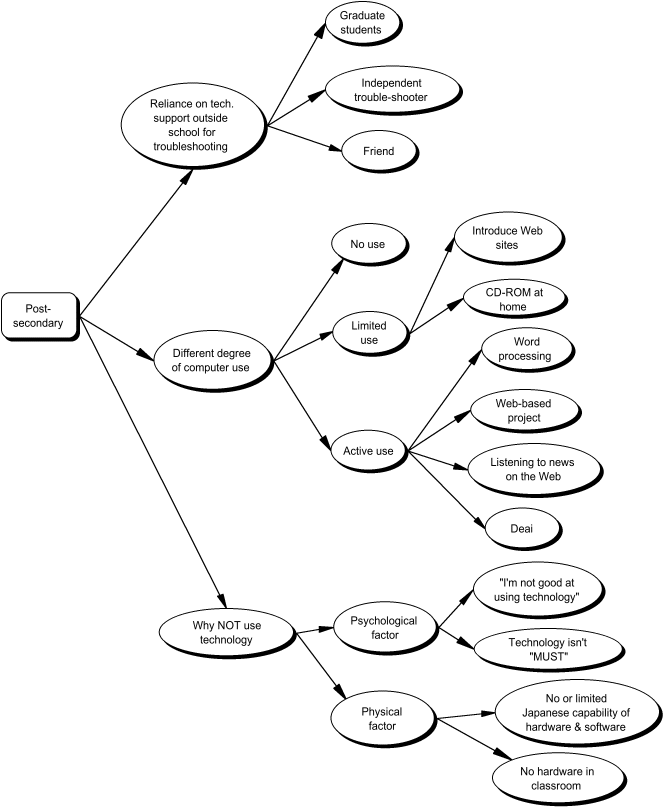
Presenters
Miyuki Fukai, Indiana University, Bloomington (mfukai@indiana.edu)
Yasuhiro Omoto, University of California, Berkeley
(yomoto@nihongoweb.com)
Keiko Schneider, Saboten Web Design(kschnei@sabotenweb.com)
This handout in print and on-line is copyrighted to Yasuhiro Omoto, Miyuki Fukai, Keiko Schneider 2003.
1. Pilot study: Survey study in Northern California
- To understand the current situation of technology use by Japanese teachers
- December 2001 and asked to return the questionnaire by January 2002
- 178 educators and 42 responded (23.6% response rate)
- A one-page questionnaire regarding technology by US Mail
- Teacher's environment for computing and Japanese capability, including technical support
- Availability of computers at school for class use
- Technology-related projects completed in class
- Analysis: Categorized the participants in accordance with their institutions
2. National Survey: Nation wide survey study
- More complete and updated picture of the current situation of technology use by Japanese teachers
- April 2002, and recipients were asked to return either the Japanese or English questionnaire by May 2002
- The questionnaires were sent out with a cover letter in English and Japanese to 500 teachers via the US Postal Service in April 2002
- Out of 500 participants, 225 responded (45% response rate)
3. Interview Study
- Follow-up to the national survey study
- Up and close interview study with practicing teachers
- Interview with teachers for about 15 minutes
- Resarch Questions
What is the teaching environment? (institution's size, how many classes,computer situation, etc.)- Follow-up e-mail questions
How helpful is Technical Support?
How were the computers used?: Technology-related projects completed in class.
Participants: 11 teachers (see Table 1 for more details)
- Elementary: 2
- Middle/High: 5
- Post Secondary: 4
- Other (Saturday Only Japanese School): one

Figure 1. Categories generated from cross-case analysis of the elementary school teachers group.

Figure 2. Categories generated from cross-case analysis of the middle/high school teachers group.

Figure 3. Categories generated from cross-case analysis of the post-secondary school teachers group.
1. Levels overview
- Elementary
- Middle/high
- Post-secondary
2. Technical support
- Japanese capability
3. Active use vs non-use
- T's readiness
- Other factors
- Incapability to write and read e-mail in Japanese is roadblock to email exchange activity (Johnson)
- Inability to connect to the Internet connectivity (Toda)
- Computers for students in class simply not available (Shimizu)
- Teachers need to troubleshoot, but simply no time or expertise (Shimizu/Johnson)
- Technology standards important for Students (Johnson)
4. How computers are used
- Similar activities were reported but middle/high most active (same as survey study)
- Projects done web search put the information together often in English-> Still just information gathering: needs to incorporate critical thinking skills
- Implications of shared computers (Maeda)
- The focus should be shifting to the educational value of using computers. The activities and tasks should fit into the existing curriculum logically and effectively, with clear instructional goals.
5. Success cases
- More frequent kanji use with word processing (Maeda)
- Vocabulary building by home-grown software (Kimura)
6. Implications/Suggestions
- How the money should be spent
- Needs to include knowledgeable support person and need to be permanent (Kimura)- Teacher training
- Teachers' reality should be taken into consideration (i.e., showing cutting-edge technologies doesn't necessarily mean "beneficial" to teachers). (Yoshida)- Need of system/community
- Technology standards for Teachers
- Develop search skills, information literacy= critically evaluate the materials
- Japanese capability especially e-mail problem and unicode
- How to best utilize authentic materials and authentic social communications
-Internet as a tool to maintain non-native speaking teachers' language skills (Johnson)
- Train tech support with multilingual computing (including server maintenance for e-mail)
- Need to build online resources for instructional purposes for Japanese language (Nakai)
7. Future of this research The presenters hope to pursue more in-depth research about the class activities: why and how computers are used how it fits in curriculum and evaluation, rather than identifying which software to use.
copyright 2003 Yasuhiro Omoto, Miyuki Fukai, Keiko Schneider